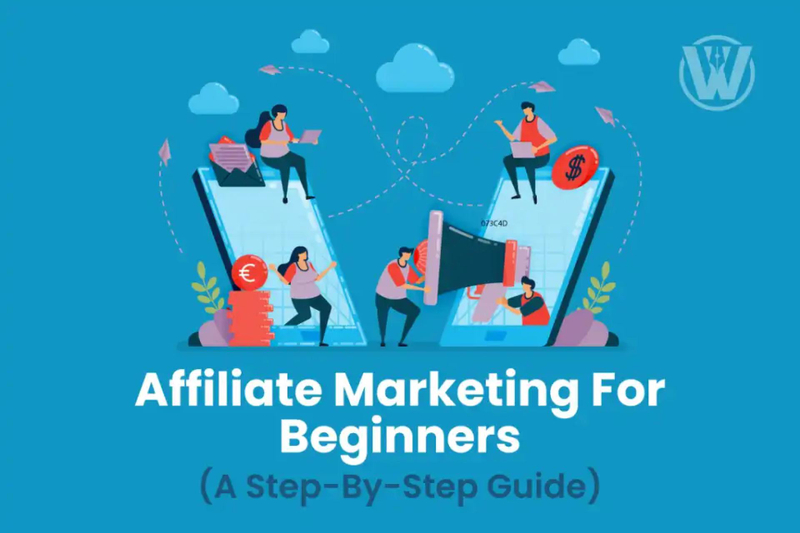Our complete guide to Affiliate marketing for beginners tells you everything you need to know about this lucrative source of passive income everyone is raving about.
Thousands of people around the world make money through affiliate marketing everyday.
And major brands are fast adopting the shared revenue business model to their sales strategy.
If you have been considering getting into affiliate marketing, you’re at the right place.
There’s never been a better time to become an affiliate marketer.
It has helped many people achieve their goals of financial freedom.
In fact, statistics show that 81% of brands and 84% of publishers in the US are increasingly leveraging the power of affiliate marketing more than ever before.
And with the pandemic these numbers have skyrocketed surpassing all economic predictions.
Presently, content marketing is estimated to convert three times more than traditional marketing with brands attributing up to 62% of their marketing revenue to content marketing.
From blogging to YouTube, Instagram, Facebook, Twitter, and LinkedIn, affiliate marketing is one of the most popular ways to make money online these days.
With everyone dreaming of promoting a product or service for just a few hours and getting paid while they sleep.
Unfortunately not everyone who does affiliate marketing succeeds, that’s why we’ve put together this guide on Affiliate Marketing for Beginners to help you navigate the world of affiliate marketing as smoothly as possible.
What is Affiliate Marketing?
Affiliate marketing is promoting another person’s products in return for a commission on each sale you generate.
Based on the shared revenue business model which offers financial incentives when you market a product and make a sale, affiliate marketing is highly beneficial to companies, brands as well as to the affiliates who promote products.
It is typically done through an affiliate program offered either by the company themselves or through a 3rd party affiliate network, sales are tracked with the use of affiliate links.
Some of the most popular affiliate marketing programs available on the web are the ClickBank Affiliate Network, Amazon Affiliate, ShareAsale, Digistore24, JVZoo, and many more.
Each platform has its own set of rules governing their individual marketplace, affiliates, and vendors.
These affiliate programs cover almost every niche you can think of ranging from physical to digital products.
Aside from these platforms, there are big brands with their own direct affiliate programs.
A good example is Target or Udemy who have their own built-in affiliate marketing programs.
Though affiliate marketing runs across every niche possible there are areas in which this marketing strategy thrives like a kid in a candy store.
A good example is with digital products, a huge chunk of the products found on affiliate networks like ClickBank and JVZoo are digital products and affiliate marketing platforms such as Digistore24 specialize in digital products exclusively.
These kinds of products fit well with affiliate marketing because they do not require any inventory nor delivery, the entire transaction is carried out remotely.
Products like courses, software, tutorials, Ebooks, etc. are ideal for affiliate marketing for beginners.
Let’s look at some of the top niches to consider when doing affiliate marketing.
Health & Fitness

One of the top niches in affiliate marketing for beginners is the health and fitness niche.
It comprises of a multitude of both physical and digital products ranging from dietary supplements to meal plans, keto diets, weight loss exercises, cleansing regimens, teas,etc.
The health and fitness niche was one of the first niches to ‘blow up’ in the affiliating marketing space.
If you are into health and fitness you will be spoilt for choice when it comes to finding a product to sell as an affiliate.
Make Money Online

Another very lucrative niche in affiliate marketing is the wealth and make money online niche.
With everyone wanting to work less and earn more from the comfort of their homes, or work while traveling the world, this niche is a gold mine.
The make money online niche offers thousands of digital products like courses, webinars, software, mentorship programs, and much more you can start promoting today.
Love and Relationship

Considering how many people are having problems in their relationship it’s no wonder why this niche is an all time best-seller.
The love and relationship niche is one of those evergreen niches that affiliate marketers capitalize on because it offers a much needed solution to people’s problems and touches their pain points.
Education
Education related products are relatively new to the affiliate marketing space but they are growing very fast with online Institutions like Udemy leading the way.
The more traditional education transitions into distance learning, the better it is for such products and for you if you decide to market them.
Spirituality and New Age beliefs
With all the recent hype around the Law of Attraction, manifestation, and meditation, this previously under-looked niche has blossomed from a tiny bug into a beautiful butterfly.
The spirituality niche is one of the fastest growing niches of 2020 and seems to be here to stay which is excellent news for affiliate marketers interested in creating content around this niche.
How does Affiliate Marketing Work?
Affiliate marketing for beginners might seem overwhelming and complex until you understand its inner workings.
The concept of affiliate marketing is a system of shared effort between several parties who all benefit at the end of each sale with the profit equivalent to individual input.
Simply put everyone does their part to sell a product and when it’s done everyone gets a share of the profit depending on what they did.
A typical affiliate marketing system is made up of 3 major parties:
- The vendor/creator,
- The affiliate/marketer
- The consumer.
1. The Creator/ Vendor
Also known in affiliate marketing jargon as the vendor or merchant, this is the owner of the product, the person who created it and has the Intellectual Property rights to the product or authorization to distribute.
It could be a big company/brand like Nike and Target or a single individual, like Tai Lopez, an entrepreneur who wants to sell his courses online.
All you need to become a vendor is a product to sell.
This party creates a product and decides to get as many people as possible to market it and make sales in exchange for a percentage of the profits.
2. The Affiliate or Promoter
Often refered to as the marketer, promoter or publisher, the affiliate plays the role of the middle man or broker bridging the gap between the creator and the end consumer.
The affiliate’s responsibility is to present the product to potential consumers in a way that compels them to make a purchase.
An affiliate marketer is a kind of facilitator whose goal is to lead consumers to a product or service they need and get paid for doing so.
The affiliate has nothing to do with fulfillment, delivery, supply or customer service. All that is left to the vendor.
3. The Consumer
As the final piece of the puzzle and the holy grail whose attention everyone is fighting for, the consumer is the driving force behind the affiliate marketing process like in every other business.
Without the consumer there’s no affiliate and probably no vendor.
The affiliate markets the product to potential consumers with interests in the product niche through blogs, social media, display ads, email marketing, classifieds,etc.
Every time someone buys, a percentage is given to the affiliate as a commission.
At no extra cost to the consumer of course and sometimes even at an affiliate discount.
How To start affiliate marketing as a beginner? ( 6 Simple Steps to Start Affiliate Marketing for Beginners )
Affiliate marketing for beginners can be quite confusing especially if you do not have a clearly elaborated strategy.
There are so many ways you can go wrong and never make any money if you jump into affiliate marketing without the right strategy.
Here are 6 major steps you have to cross from your list to stand a chance at being successful in affiliate marketing.
1. Choose a Market or Niche
Picking the right niche is the single most vital step in your affiliate marketing journey.
The very first decision you have to make when starting out as an affiliate marketer is what to promote, and what you choose will either make or break your career.
You should focus on choosing a niche that suits your interests, preferably one you’re passionate about, have knowledge on or at the very least interested in carrying out research on and knowing more about.
Why choose a niche instead of a product?
As tempting as it may be to pick a wide variety of products to promote, doing so is a recipe for disaster.
This is because a single product greatly limits you to a small audience, one purchase per person and reduces the conversion rate.
While choosing a market helps you expand and reach out to more people automatically increasing conversion rates.
Focusing on a niche instead of a product also gives you an opportunity to upsell to your audience since you have the advantage of promoting any product within your chosen niche.
Having several products that are related considerably increases your chances of being profitable way more than promoting a variety of products across several niches.
2. Create a Blog
Once you have decided on a niche, the next important step is to create a blog if you don\'t have one already. If you are new to blogging you can check our step by step tutorial on how to start a blog .
Blogging is the most organic means of driving traffic to an offer, a well written blog with the right SEO can be a gold mine when it comes to promoting an affiliate product.
With a blog or website your focus should be on educating your audience on the products you are affiliated with as well as persuading visitors to make a purchase.
A well ranked blog on Google does not only drive traffic to your affiliate links, if you incorporate an opt-in page through which you collect emails you can leverage your traffic to convert twice as much with a follow-up email series.
All you need to do is add an email marketing tool like MailChimp, Aweber, or ConvertKit to your blog to capture emails.
If you’re not into blogging, you could promote your affiliate link through social media platforms like YouTube,Facebook,Instagram, Twitter, LinkedIn, Tiktok, etc.
Affiliate marketing on Instagram is the new way people are making 6 figures online while they sleep.
With the rise of influencer marketing it is easier to either build a theme page through which you can promote products or get an influencer to recommend your products to their followers for a fee.
3. Choose a product to promote in your niche
After picking a niche market, the next step is to choose a product to promote.
Choose only 1 or 2 products to promote when starting, when you have mastered the playing field you can add more.
Many products in one go for a beginner will split your focus and negatively affect your conversion rate.
It is recommended you stick to one product in the beginning until you have fully understood how your niche operates, what your audience wants, and what they respond to.
Another thing you have to bear in mind when choosing a product is quality, make it a point to test products before promoting them especially physical products.
If it’s not possible to test the product get as many reviews on the product as you can in order to be sure of the quality.
The last thing you need is to have charge backs, refunds, or be flagged for bad reviews.
Ideally, you should go for a product that delivers what it promises.
Preferably a product with ready-made email marketing swipes, pictures, videos, ads, and done for you landing pages.
4. Create content readers like to read
Good content is your best shot at building a long term business with affiliate marketing.
Create content that offers value to your readers, make a habit of providing valuable information in your posts, propose solutions to problems in your niche, answer questions about a specific product, do a product review for what you are promoting.
Try as much as possible to build trust and a loyal following within your chosen niche.
Gather enough information and knowledge to become an expert authority in your chosen niche and leverage that for more sales.
Review both physical and digital products to expand your reach, focus on telling your readers why they need the products you are promoting, the difference it will make in their lives, the products pros and cons, etc.
Be sure to put out unique content and not what is already everywhere on the web, if your content can stand out you’d carve a sweet spot for yourself.
5. Use SEO, link building and other Traffic Generation Techniques
Considering how saturated with information the web is these days, writing a good blog and posting it isn’t enough.
You can put out an amazing post and no one will even notice.
That’s where SEO and link building come in, traffic generation techniques are the oil that makes the machine run smoothly.
They will take your content to the right audience and help you rank on Google search engine when done right of course.
Start by finding a good keyword tool, there are a number of free and paid options you can get.
Organically insert the relevant keywords into your content and watch the magic happen.
The next approach is link building, never overlook the power of a good link building strategy.
That’s why networking is paramount when you’re running a blog, use every opportunity you get to back link your content on other blogs and web pages.
Reach out to content creators in your niche and get them to collaborate.
You would be surprised how many of them will be open to the idea.
Answer questions on Quora related to your niche and link back to your blog.
Watch to see which of these strategies gets the best results and then double down on that one.
6. Start adding more products from your niche
Affiliate marketing for beginners requires you never stick with a single product or merchant, learn to diversify within your niche.
Once you have mastered your first product add another one and keep on doing so until you have a funnel with upsells and offers in the back end.
This strategy helps you create a consistent income stream and a thriving affiliate marketing business.
As you diversify make sure you don’t lose touch of your audience interests, with the millions of products available in the market, it’s easy to get carried away.
Keep it personal so as to maintain the rapport you have built with your readers.
Likewise, don’t just go for a product because it’s in your niche, do your due diligence and make sure it is a good product with great benefits that will appeal to your readers and meet their specific needs.
Follow trends in your niche, product releases without losing sight of your true essence.
Tailor your content to your products and be consistent, this will certainly cement your spot in your niche and help with conversions.
How to find Affiliate Programs?

If you’re thinking of diving into this line of work and you’re wondering how to find programs that are suitable for affiliate marketing for beginners, there are quite a few options at your disposal.
First of all there are two ways to go about it, you either join an affiliate marketing platform or become an affiliate directly with a company.
Brands either manage their own built-in affiliate programs or use an already established affiliate network.
Most affiliate networks have a marketplace where you can find products suited to your niche.
You’ll have to go inside the niche you’re interested in and filter products according to their performance.
The more popular a product is the better your chances are of making money from it.
These are some of the most sought after affiliate marketing programs:
- Clickbank
- JVzoo
- ShareASale
- Commission Junction
- RevenueWire
- A4D
- LinkConnector
- AvantLink
- Amazon Affiliate Program
- eBay Partners Program
Big brands and even fortune 500 companies have affiliate programs you can access on their website, from Amazon to Shopify, Udemy, and Adidas all understand the power of affiliate marketing as a sales tactic.
You can also contact a company you’re interested in and ask to become an affiliate for their products, this could prompt them to start an affiliate program or give you a special coupon code to track your sales.
Affiliate marketing programs and products often come with terms and conditions you have to respect if you intend to promote these products.
Some will have restrictions on how to market the products, on using the brand name or certain types of ads.
Make sure you do your research and know all there is to know about a product before you start promoting it.
Where and how to find products to promote is the easiest part of affiliate marketing unlike finding the right product that meets all requirements and is consistent with your niche.
For example as a tech blogger you have no business promoting a beauty product, it will throw off your audience, but you can branch out and promote a fitness product if it is also tech.
One of the reasons why affiliate marketing is so popular these days is because of the flexibility it offers, you’re always spoilt for choice when it comes to products, there’s always something for everyone.
How to become successful in Affiliate Marketing?

Affiliate marketing for beginners is pretty straightforward and easy to get into but succeeding is a different ball game.
Many people promote affiliate products and never make any money, while others make 6 figures with the same products.
At the end of the day, the difference between a person making $100 in sales and the one making $100,000 is in the approach.
As the saying goes, the devil is in the details that too applies to affiliate marketing.
Here’s a list of the things you should be doing if you want to succeed at affiliate marketing.
1. Make it personal
Your best chance of standing out in a pool of affiliates and content creators when you get into affiliate marketing as a beginner is to pick products that are dear to you, those in which you have a special interest.
Prioritize products you personally appreciate and then share your experience and first hand knowledge of the product.
Your greatest asset when you’re starting out will be to solve your audience’s problems and get readers to relate with you.
If you succeed in building rapport with your audience, they’ll be more likely to trust your recommendations.
The best way to do this is to get their contact and send them personalized emails with valuable information at least once a week.
2. Do Product Reviews
Reviewing products in your niche is a good way to gain organic traffic and conversions you can scale.
The advantage of product reviews is that it is highly targeted, it mostly captures the attention of those who are already looking into buying the product which makes it easier to get conversions.
All you need is to do a detailed, articulate, and value packed review on any product of your choosing accompanied by your affiliate links.
3. Diversify within your niche
Do not only rely on only one product or one program, spread yourself across a number products and affiliate marketing platforms so you have options if one comes crashing down.
However, when getting into affiliate marketing, it is important for beginners to stick to a single niche and grow it.
It is also recommended that you build an email list of prospects in your niche and consistently send them valuable information to build trust.
Better still, set up an automated email series that comes in motion the moment someone subscribes to your email list.
4. Leverage Social Media
Use the various social media platforms as a tool to engage with your audience.
Join Facebook groups in your niche.
Create a Facebook page, reach out to prospects, and run paid ad campaigns if you can.
Bear in mind that affiliate marketing on Instagram is at an all time high, meaning it is one of the surest ways of getting free highly targeted traffic.
5. Stay Tuned to Current Trends
Given how competitive the affiliate marketing and ecommerce space is, the only way you can succeed in affiliate marketing as a beginner is if you stay tuned to news in your industry.
Try as much as possible to be aware of product launches, new releases, seasonal trends, etc.
A platform like JVzoo outlines almost all new products in the market and their launch dates.
Google trends can be very helpful and you can access it for free.
Moreover, keep an ear to the ground for new marketing strategies other affiliates are using.
What are the different types of Affiliate Marketing?

Different products and platforms have a different approach to affiliate marketing that’s why it’s advisable to educate yourself on the terms, conditions and details of every product before promoting it.
Everything from cookies, to payout, refund policies, tracking, and affiliate support should be examined in detail.
That said, here are the most common types of affiliate marketing systems you’d find, each offering its own advantages and drawbacks.
PPS (pay-per-sale) Affiliate Programs
With PPS affiliate programs, you get paid through commissions and you receive a commission only when a purchase has been made.
The commission is always a percentage of the product price ranging from 1-50%.
This method often takes time, it could take anywhere from 30 - 90 days to get paid due to the fact that most offers come with a 30day money-back guarantee.
The vendor has to make sure there are no chargebacks and refunds before releasing your commissions.
However, it is often the most lucrative of all the different types of affiliate programs.
Recurring Commission Programs
Recurring commissions are the height of passive income, all you need is to sell once and you’ll be paid every month without lifting a finger.
This is very common with subscription products and services.
A good example is Clickfunnels.
When someone signs up for Click funnels through your affiliate link, you get paid every month as long as they pay their monthly subscription.
PPL (pay-per-lead) Affiliate Programs
Here the affiliate is paid every time a person signs up to the product page, he doesn’t have to buy.
If he subscribes to the newsletter or leaves his contact information the affiliate receives a commission.
PPC (pay-per-click) programs
As the name suggests, you get paid for every click that comes through your affiliate link.
All you need to do is drive traffic from point A to point B, even if no action is taken you still get paid. It is the easiest of all that’s why payment is very low.
Sitewide commission programs
This means that if you refer a customer to a product website and they buy other products even the ones you didn’t recommend you still get a commission.
This type of affiliate marketing always comes with a coupon or discount code for your customers to give them an extra incentive to buy.
Pros and Cons of Affiliate Marketing
There are many reasons why affiliate marketing should be at the top of the list of your ecommerce journey and additional income streams.
A source of passive income
Affiliate marketing is lightweight and passive enough for you to do alongside your full-time job without any problems.
Once you’ve done the heavy lifting at the very beginning and your system is in place, it can be very hands off.
It is the ideal side hustle and some of the process can easily be automated and outsourced if you want to.
You can get someone from Fiverr to create content for you and make use of an autoresponder to keep your audience engaged without having to be there all the time.
A Cost-effective Business
Affiliate marketing is considered one of the most low to no-cost branches of ecommerce.
Very little or no start up capital is needed to begin an affiliate marketing business.
If you decide to go the free traffic route, the only thing you’ll be paying for is web hosting and that’s quite low.
There’s no inventory nor product cost or shipping cost, and there’s always the possibility of promoting your products through an Instagram theme page, a YouTube channel or a Facebook group all of which are completely free.
So, even if you are penniless you can still get into affiliate marketing.
Flexible and Convenient
What’s better than the freedom and independence you get from working at your own pace from anywhere in the world?
With affiliate marketing you can work from home or from the beach in any part of the globe it doesn’t matter.
You also have the liberty to choose products that are convenient for you and suit your needs.
You can scale and diversify as you please, there are no restrictions, limitations, or constraints.
Work 1 or 4 hours a day, in your underwear or in a swimsuit it doesn’t matter.
In affiliate marketing what you put in is what you take out, it’s all up to you.
No customer service
Affiliate marketing allows you to skip all the hassle that usually comes with a sales business.
No inventory, no customer service, no logistics and no office politics.
Dealing with customers is no small feat, customer service can be quite draining especially when you are scaling your business.
With affiliate marketing the only thing you have to worry about is promoting the product.
At the same time there are some negative sides to affiliate marketing too:
No control over the product/service
As an affiliate you don’t get any say over the product you’re promoting, the vendor makes all the important decisions, be it concerning product development, delivery and everything else in between.
That’s why you should always test a product before recommending it to your audience.
Unreliable affiliate platforms or programs
Since it’s money we are talking about, affiliate marketing requires you to vet any platform or company whose product you intend to promote.
There are lots of scams in affiliate marketing, so, if you don’t want to fall prey to unscrupulous vendors and networks who might not pay your commissions, pay close attention when choosing an affiliate program.
FAQs in Affiliate Marketing for Beginners
Becoming an affiliate marketer is pretty straightforward, the hard part is setting up a long term business with the affiliate marketing business model.
In summary these are the 5 steps you should follow if you want to become a successful affiliate marketer.
- Pick A Niche Market - As earlier mentioned it can make or break your affiliate marketing endeavors. Focus on choosing a niche instead of a product and make sure the niche you choose is profitable and not too saturated as well as something you enjoy.
- The next step is to create content around your niche to promote the products you will choose. You can opt for a blog, an Instagram page, a YouTube channel, or Facebook group.
- Find products you’ll like to promote that suit your niche and link them in your content.
- SEO optimize and back link your content to grow your ranking and drive traffic to your affiliate links.
- Add an opt-in page to your content and collect contacts, create an automated email series providing value to prospects on your email list.
Sit back and watch sales roll out, then rinse and repeat as many times as you want until you’re satisfied with the results.
Affiliate marketing is probably the only ecommerce business you can start today with no money.
All you need to do is sign up to become an affiliate on ClickBank, ShareAsale or any of the other affiliate networks, choose the product you want to promote, generate a hoplink and start driving free traffic.
Start a product/service review channel on Youtube and put your affiliate links in the description.
Go to Quora and answer a question in your niche linking it back to your content.
Promote your product for free on sites for classified ads like Craigslist and Locanto.
Make use of Facebook groups and Instagram posts to promote your product for free.
As an affiliate marketer you get paid every time you link a buyer to a product, it is quite similar to being a traditional broker the only difference being you never get to meet the vendor nor the buyer.
And sometimes you don’t even need a sale to be paid all you need is to provide a promising lead or a potential customer.
Here’s how affiliate marketers get paid:
Payment per sale:
This metric requires you to get paid only when someone buys a product you recommended.
No sale means no money.
You could be paid anywhere from 1- 50% commission per sale.
Payment per lead:
Here the sale must not be concluded for you to get paid.
If you refer a potential customer, someone with genuine interest in the product you’re compensated.
This is based on the belief that the vendor can flip the leads interest into a purchase down the line.
However, payments here are considerably smaller than payments per sale.
Pay per click:
This method is centered around getting the affiliate to get as many interested people as you can to click on the product page or vendor’s website.
In such instances you receive a fixed rate for every thousand clicks.
This method is more about driving traffic than making a sale, and payment is often the lowest in comparison to the other methods.
In summary, when considering affiliate marketing, for beginners specially the most important aspect is building trust.
If you can get your audience to trust you then you can easily get them to act on your recommendation.
The niche market is important, so too is the product you choose to promote, however, conversion is determined by your relationship with your audience.
Follow this guide and you’re off to a good start.


